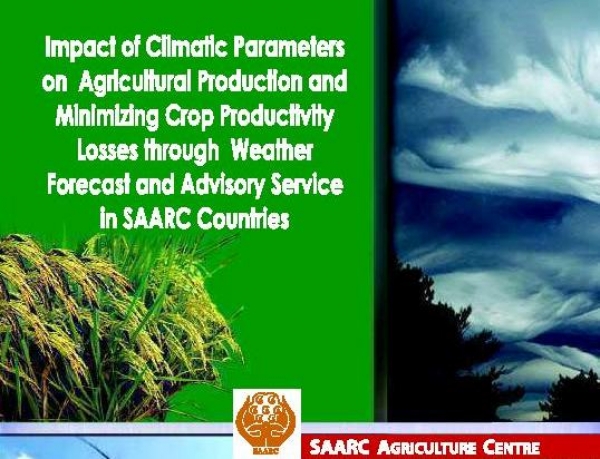SAARC Agriculture Centre (SAC) as a regional centre for agriculture research and development initiated series of regional studies and consultations on emerging issues impeding agricultural development. The efforts have resulted in publication of 16 manuscripts which are of relevance to agricultural researchers, extensioninst, policy makers and farmers as well.
The SAC has uploaded the documents in their website and can be accessed and downloaded free of cost from http://saarcagri.org/images/abook_file/climatic_parameters.pdf
This is in addition to the publication of SAARC Journal of Agriculture which can be accessed online via http://saarcagri.org/index.php?option=com_abook&view=category&id=11&Itemid=247
We are certain that both sets of publications will be relevant reference material in enhancing better understanding and taking forward the agriculture in SAARC region.
Executive Summary of the Publication
Climate variability witnessed in recent years is not new. It has been, and continues to be, theprincipal source of fluctuation in global food production, particularly in the semi-arid tropical countries of the developing world. In conjunction with other physical, social and political-economic factors, climate variability contributes to vulnerability to economic loss, hunger, famine and dislocation. In the developing countries, where adoption of improved technologies is too slow to counteract the adverse effects of varying environmental conditions, climate fluctuations are the main factors that prevent the regular supply and availability of food, the key to food security. Hence it is imperative that weather and climate variability aspects are well understood so as to formulate more sustainable policies and strategies to promote food production and food security.
It has long been recognized that if society could have advance information on weather, the adverse effects associated with it could be minimized. Climate determines the general adaptation of ecosystems and land use activities at any location. Year to year recurrences of
extreme climate events such as drought, flooding, hot/cold spells, etc. often have far reaching consequences in agriculture. Advance warning of such events through climate prediction can minimize various socio-economic problems which are often associated with such events. The severity of the socio-economic impacts of climate related stress varies significantly from one region to another. The impacts are generally more severe in many developing countries particularly in SAARC countries where technological adaptations are often very low, and where most of the agricultural systems are rain dependent.
It is necessary to replicate the successful model of agro-advisory services developed by India or other developed countries to be replicated in the SAARC countries with the following objectives.


Facebook comments